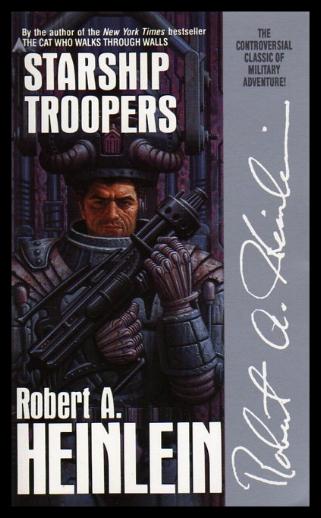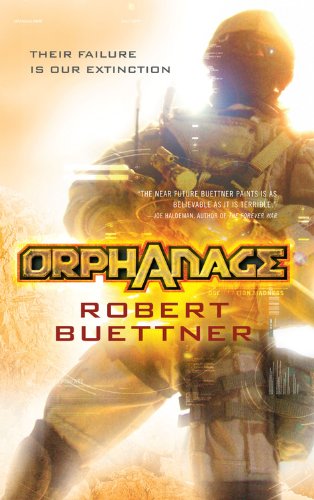Today is the ninety-fifth anniversary of the Armistice of Compiègne, which ended World War I, or at least the war between the Triple(or more, really) Entente and Germany, on November 11, 1918. Starting the next year, many of the Entente nations declared national holidays on the anniversary of the armistice. In the United States of America, it was known as Armistice Day until 1954, when Congress officially changed the holiday to Veterans Day, which has remained associated with the holiday ever since. Now, in the US we have a holiday in May for the remembrance of those who died in the armed forces (talked about first here and again here). Veterans Day, on the other hand, is dedicated to honoring veterans serving, retired, or passed away and to connect that honor to our everyday lives in a way that is distinct to the respectful rites of Memorial Day.
Today, I'm going to quickly highlight Veterans Day with a short list of great science fiction books. These books fall into the great tradition of what is known as the military sci-fi subgenre. Military sci-fi comprises story where military hierarchies, tradition, logistics, and/or tactics factor as heavily into the plot and setting as alien worlds and futuristic technology. What's interesting about these sorts of stories, when compared to traditional space opera, sci-fantasy, or social drama sci-fi, is that it respects the interaction of characters and traditions as somewhat timeless in the scope of how men and women conduct war. The three books I'm highlighting below, however, are not just really good pieces of military sci-fi; they're also all written by veterans, which allows a reader to analyze the book meta-textually. In so doing, these books aren't just great action-packed sci-fi classics, but they're an alternative way of approaching and analyzing some specific veterans.
They're also pretty quick reads, too.
Starship Troopers was written in 1959 and has remained one of the flagships of the subgenre of military sci-fi ever since. It's less of a conventional war story as it is part snapshot of a military oligarchical society and one teen's coming of age within that tradition. I've been a fan of this book since the fourth grade, and I think I've bought it at least a half-dozen times over the years out of a compulsion to always have one at hand. (Not unlike the way Jerry keeps buying copies of The Catcher in the Rye in the movie Conspiracy Theory.) Starship Troopers was written by Robert Heinlein, who graduated from Annapolis Naval Academy in 1929 and retired as a Naval Lieutenant in 1934, and is one of a smattering of not insane pieces of sci-fi written by him. I also recommend Space Cadet, The Moon is a Harsh Mistress, and Red Planet for anyone interested in more of his books, but many of his others are really out there. But this one is a fairly short, fast-moving read that provides a good survey of the major themes of this category of fiction.
The Starfist series of novels is a great collection of 14 novels set in the 2400s. The premier entry in the series, First to Fight, was published in 1997, and presents the marines of the 34th FIST (Fleet Initial Strike Team) performing glorified police work on an inherently unstable world in the middle of yet another brushfire war. If you ignored the publication date, you might think the fiction is reactionary to early War on Terror military stories. The two things I really love about this series of books both relate to the elegance of the series' conceit: it all follows a specific company starting in a specific year. In the early installments, this means that the Confederation of Human Worlds has yet to make contact with intelligent (and hostile) aliens, and the conflicts of the first four books are about dousing political fires on the outskirts of human space. Secondly, the authors consistently draw characters and resources from a genuine military company, meaning that characters that are dropped as names in one book might become main characters you root for in later books, and that the politics of the unit's organization mean more to you as the series goes on. The series was written by David Sherman, who served 6 years in the United States Marine Corps before retiring as a Corporal, and Dan Cragg, who retired as an Army Sergeant Major after 22 years in uniform. They give the series a concentrated level of (US) military culture that sometimes comes off as a bit stereotypical but is always consistent and oozes bravado throughout.
Orphanage is the first of a series of seven (and counting) novels set in a near future interstellar conflict. The first book especially takes a lot of stylistic inspiration from Heinlein's Starship Troopers, though with a lot more action and dialed in characterization of the supporting cast. The first book begins with earth getting bombarded by aliens from the outer reaches of the solar system. As the entire planet reels from the devastating attack, they mount a suicidal expedition to counter-attack the alien presence on Ganymede. The mission is considered so dangerous that the powers-that-be declare that all soldiers selected for the mission must be orphans of the war, earning the book its title and setting a desperate, wounded motif for the series. Robert Buettner, who served as an Army intelligence officer, eventually takes the series into bigger themes, as the war forces humanity to reach out to other stars to battle the aliens throughout the galaxy. There's a lot of great sci-fi that plays intelligent homage to several other authors and series, though the focus and style of the action shifts greatly throughout the books as the nature of the war itself evolves. This is a great feature if you're prepared for it, but if you aren't it can be jarring as politics, logistics, and ethics quickly take the fore.
I hope you take the chance to thank the service people in your life this Veterans Day, and definitely check out these great novels whenever you get the chance. Besides being enjoyable nerd-fodder, they just might encourage you to think differently about these issues next Veterans Day.




No comments:
Post a Comment